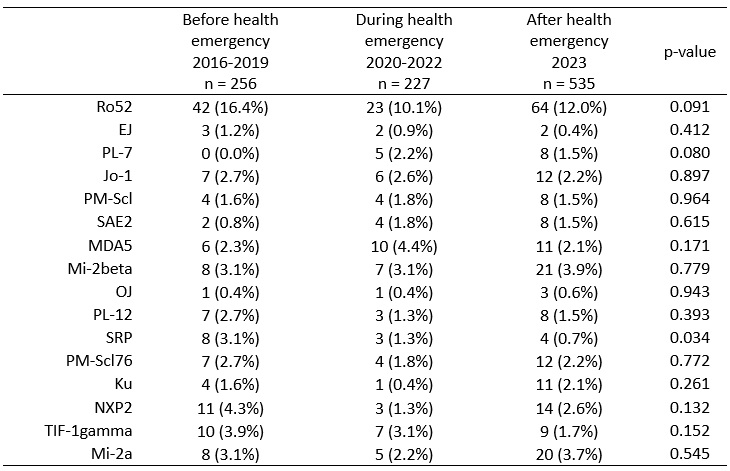Session Information
Date: Sunday, November 17, 2024
Title: Muscle Biology, Myositis & Myopathies – Basic & Clinical Science Poster II
Session Type: Poster Session B
Session Time: 10:30AM-12:30PM
Background/Purpose: Idiopathic inflammatory myopathies (IIM), also known as myositis, are a group of heterogeneous autoimmune disorders that lead to muscle injury. Autoantibodies help make the diagnosis of IIM and they can predict the prognosis of the myositis. There have been reports from the COVID-19 pandemic that associate infection of SARS-CoV-2 with worsening disease activity and hospitalizations. We aim to describe the prevalence of autoantibodies for IIM before, during and after COVID-19.
Methods: A cross-sectional study was performed from July 2016 to December 2023 in the rheumatology service of a University Hospital. An immunoblot panel of autoimmune inflammatory myopathies with 17 autoantibodies was performed on patients with suspected IIM. The results were compiled in a database during this period. The cut-off points for categorizing the immunoblot results were: 0 – 7 negative; 8 – 14 borderline; 15 – 35 weak positive; 36-70 moderate positive; and 71-255 strong positive. We considered only moderate/strong positive autoantibodies. We separated patients into 3 groups: before COVID-19 (2016-2019), during the health emergency COVID-19 (2020-2022), and after it was no longer considered a health emergency in Mexico due to high immunity from infection and vaccination in 2023. Qualitative variables were compared using Chi-square.
Results: A total of 1018 patients were screened in the last 8 years, 256 (25.1%) panels were performed between 2016 and 2019, 227 (22.3%) between 2020 and 2022, and 535 (52.6%) in 2023. The autoantibody with more frequency in the 3 groups was Ro52. There was no significant difference in the proportion of the different positive autoantibodies, except for SRP showing a higher frequency before the health emergency (Table 1).
Conclusion: There was a marked increase in demand for autoimmune inflammatory myopathy panels after the health emergency caused by COVID-19, the panels were requested over 6 times more than in previous years. Despite the significant increase, there was no difference in the proportion of positive autoantibodies compared to the other groups.
To cite this abstract in AMA style:
Garza-Elizondo A, Arvizu-Rivera R, Gamez-Siller P, Salcedo-Soto D, Cardenas-de la Garza J, Garcia-Arellano G, Villarreal-Alarcon M, Galarza-Delgado D. Impact of COVID-19 on Myositis Testing Trends [abstract]. Arthritis Rheumatol. 2024; 76 (suppl 9). https://acrabstracts.org/abstract/impact-of-covid-19-on-myositis-testing-trends/. Accessed .« Back to ACR Convergence 2024
ACR Meeting Abstracts - https://acrabstracts.org/abstract/impact-of-covid-19-on-myositis-testing-trends/

